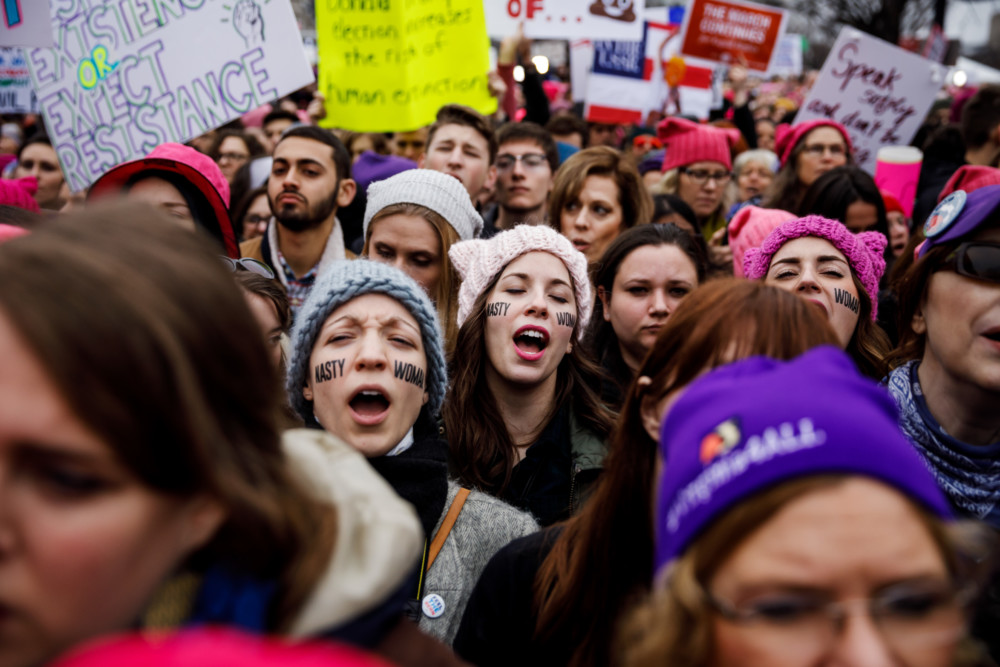Opinion
By Nancy Kaffer
Detroit Free Press
WWR Article Summary (tl;dr) Nancy Kaffer from the Detroit Free Press shares her thoughts on this past weekend’s Women’s March. She also shares some of the stories of other Michigan women who traveled to D.C.
Detroit Free Press
It was a long ride home.
Plenty of time, on the bus back to Michigan, to consider the Women’s March on Washington. To share new stories with new friends, or to dissect one’s own role in the protest. To absorb the waves of media coverage and social media posts, from effusive to cynical. To calculate the success of the fledgling movement, or reflect on the path that led to Washington. To wonder if everything had changed, or if nothing had.
At Saturday’s march in Washington, and its sister marches in every U.S. state and around the globe, mostly women, mostly white, but millions strong, rallied against threats made by President Donald Trump and Congressional Republicans to dismantle the Affordable Care Act; to overturn the landmark U.S. Supreme Court case Roe v. Wade; to dilute the social safety net until it no longer serves as a safeguard; to harass and target immigrants, women, LGBT Americans, people of color, or anyone for whom myths about America’s past greatness are a hollow lie; to turn our schools into ideological experiments at the expense of our children.
By Sunday, the elation of the march had become firm resolve.
“I’m just not going to shut up,” said Cynthia Pickens, 62, of Northville, a retired mail carrier and owner of a catering business. Wyandotte resident and Episcopal preacher Colleen Lough, 59, used nearly the same words: “I will not sit down, I will not shut up. I will be heard.”
Josie Huss, a 22-year-old graduate student from Kalamazoo said: “I was staring at the speakers with tears in my eyes, wondering what are we going to do now? What if we are ignored? Then after the march, I turned on the TV and the news was wild about it and it was like … that was huge.”
“When I think about all the ways in which women adjust their lives to be physically safe, it just makes me sad,” said 61-year-old Teresa Killeen, an Ann Arbor attorney. “When I go into a parking structure, I have to have my guard up. Men don’t have to do that.”
Madeleine Jones, 70 of Grosse Ile said: “I wanted to be able to say I stood up.” Jones, a retired science teacher wrote her name and address on her arm in black marker, a safety measure urged by march organizers that would enable rescue workers to identify a body, if the march were attacked. “I did stand up and I did participate, but that’s only the beginning, and we know it is.”
So what now?
Critics of the march have suggested that despite the overwhelming turnout and the great distances many women traveled to participate, Saturday’s marches were easy activism, and that one day’s participation won’t become the kind of sustained effort it takes to effect real change.
That’s crazy talk.
Sunday, march organizers started a new campaign, 10 suggested actions over the first 100 days of Trump’s presidency. First up: sending postcards to senators, to tell them what you’re concerned about.
Yes, it’s difficult to sustain energy and passion. And it’s a long road to the 2018 midterm elections, or the 2020 presidential election. But none of the women I spoke to questioned the need to keep it up — or doubted their own ability to stay on target.
“For me, it was a place to put some of that frustration I’ve felt since the election, and signal to the current administration that there are 66 million who voted who didn’t vote for his policies,” said Becky Chadwick, a 59-year-old college administrator. “And to communicate that we are becoming more active, that we will be watching, we will be paying attention, we will be engaged in the political process from here on.”
And, woman after woman told me, communion with other women attending the marches offered confirmation that their fears for the future aren’t baseless, and made the idea of inaction impossible.
“It’s this simple — silence is being complicit,” Lough said. “If you don’t say anything, you’re complicit in what is going on.”
It’s that very notion that’s rankled other critics of the march, activists who’ve wondered why, in a world so broken, white women — 53% of whom voted for Trump, befuddling the roughly 47% who didn’t — seem only to have awoken en masse to injustice now.
That’s a question Pickens tried to answer.
It’s not that she didn’t care about injustice and inequity, Pickens told me — it’s that she wasn’t sure anyone cared what she thought.
“I didn’t think my voice would add value,” she said.
It’s impossible to say whether Pickens’ experience is common. But in critiques of newfound activists, or questions about their resolve it bears considering — our culture is efficient at communicating the message that women’s voices don’t matter, that standing up or standing out is risky.
But Trump — and Trump’s election — has changed the stakes. That nearly half of American voters chose a man as president who has discussed women, and women’s bodies, in the most crude and demeaning terms imaginable, felt, for many, like a referendum on their own personhood, and a reminder that autonomy, or even basic safety, aren’t guaranteed.
Now, women told me, it’s not standing up that seems most dangerous.
“It’s fun and games until it really gets tough. It’s fun and games to march when you’re safe,” Jones said. “We have to make sure it doesn’t get tough. We have to stand firm.”














































































































































































































































































































































































